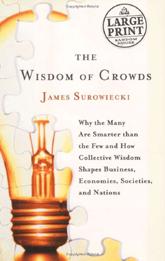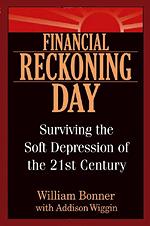 When we took our leave, we had just read part one of Mr. James Surowiecki’s much-discussed book, The Wisdom of Crowds. It was not as bad as we feared. Mr. Surowiecki seemed to us like a teenager who had just discovered sex. He didn’t quite know what to make of it, but he was clearly looking forward to it.
When we took our leave, we had just read part one of Mr. James Surowiecki’s much-discussed book, The Wisdom of Crowds. It was not as bad as we feared. Mr. Surowiecki seemed to us like a teenager who had just discovered sex. He didn’t quite know what to make of it, but he was clearly looking forward to it.
What he had stumbled upon was civilization, the infinite and subtle private arrangements that allow people to get along and make progress, without anyone in particular telling them what to do.
Alone, a man cannot really do much. He is only in his present state of comfort as a result of centuries of tugging by millions of different people. Someone had to figure out how to use fire. Someone realized that you could burn oil. Someone else had to discover iron. Someone, somehow, sometime put the pieces together…and millions of others…to manufacture the modern automobile. Even with access to all the accumulated knowledge of 100 generations, a man alone could never manufacture even a single automobile. There are too many component parts involving too much local knowledge. On his own, he’d be lucky if he could fashion a crude go-kart out of soft wood.
The more elevated a man’s situation, the more he relies upon the knowledge, expertise, capital, and goodwill — not only of past generations, but of his neighbors…and many people he has never met. That is how civilization works. Two heads are better than one.
Even — or perhaps especially — the world’s greatest and loneliest geniuses realize that their contributions rest largely on the work of others. Newton mentioned that he could only rise so high because he was "standing on the shoulders of giants." Science is cumulative and universal. Newton could draw on work done by foreigners hundreds of years ago. But he used his famous phrase in a letter to a rival, Robert Hooke, who was a dwarf. Science may have marched forward, but Newton’s heart was as mischievous — or perhaps as cruel — as any since the Flood.
Mr. Surowiecki seems only dimly aware of what goes on in the human heart. Again, he is like a teenager who just discovered sex. He is so fascinated by the mechanics of it, he has not yet thought about the perverse and cynical possibilities. Yes, groups of people can solve problems. Yes, groups of people can come up with good ideas. Yes, groups of people — drawing on diverse information and insights — can create things that no individual alone could possibly imagine.
And yes, as the author allows, sometimes groups get things wrong. They are often bullied by a single person. They tend to think alike. They are easily distracted. But when people can work together — with no one holding a gun to their head — people have a way of getting along and accomplishing things.
But a group of people working together is not the same as a crowd. And a crowd is not the same as a mob.
A group is merely an aggregation of individuals, each with his own independent opinions and information. A group is also a collection of private individuals, each with his own private goals.
A crowd, on the other hand, comes together and begins to act as one — and soon makes a public spectacle of itself. An army, for example, is a crowd. It acts with one mind. One emotion. For one purpose. In an army, independent thought is discouraged. Deserters are shot. As we have pointed out often, you wouldn’t want to go into battle with a free-spirited intellectual at your back; you want a real blockhead with a singleminded goal: to kill the enemy and protect you.
The biggest fear of military leaders is that their army will cease to be a disciplined crowd…and turn into a mob. It will still act as one — with one over-reaching emotion firing up every grunt’s heart — but the emotion is likely to be fear…that will destroy the effectiveness of the fighting group.
Groups of investors sometimes turn into crowds. They do so when they all stop thinking independently, and begin to act as one. The crowd may be moved by fear or greed. In either case, it is likely to overreact to news…and overprice its favorite investments.
Mr. Surowiecki notices all these things, more or less. He notes that neither voters nor investors are exactly the rational creatures of academic imagination. He realizes that they are, from time to time, led astray by various influences. Yet, somehow, he fails to notice the key feature of the u2018crowd’ that separates a healthy, efficient group from a great mob ready to get itself into trouble. Once again, like his New Yorker feature on gold, he has managed to write something that is wise and moronic at the same time. It is wise to notice that two heads are sometimes better than one. It is moronic to fail to notice why.
Yesterday marked the 60th anniversary of the liberation of Auschwitz. The extermination of the Polish Jews was something that no man could have accomplished on his own. It took the cooperation of thousands — no, probably millions — of people to make it work. Administrators had to do the paperwork. Policemen and soldiers had to round up the victims. Rail workers had to get them to their destination. The prisoners had to be fed (minimally) and housed (badly) before they could be exterminated. Then, the bodies had to be disposed of. This, too, was a remarkable engineering problem…requiring the efforts of hundreds or thousands of people… These people who had to stand on the shoulders of many generations of engineers before them…so they could push a few generations of Jews into open trenches…or burn them in open-air furnaces.
Where was the wisdom of the crowd? Surowiecki doesn’t bother to raise the question. Perhaps there was not enough "diversity" in the Nazi ranks, he might suggest. Maybe, the Nazi leadership was not open enough to different points of view, he might say. The Nazis were not "independent" enough, he might add; nor were they allowed to express their "private judgment."
All of these things may be true. But who was going to stop a top SS meeting and suggest that they bring in a gay gypsy or Bantu democrat to give an alternative point of view? Who among them doubted that they did not already have all the judgment, opinions and information they needed?
Likewise, at the peak of the bubble market in tech stocks at the end of the u201890s, what investor who had made a fortune on Microsoft and Amazon wondered if he needed more diversity in his portfolio?
When the crowd takes up a corrupt wish — to get something for nothing…or to make the world a better place by killing people — the last thing it wants is another point of view. It is already too late for that. The few people who are able to think clearly can only try to get out of the way. If they are in a bubble market — they can easily sell. If they are in a country that has lost its head, they can try to leave. If they are in an army, there is not much they can do at all.
And so we come to the end of Surowiecki’s little book and we realize that he missed the whole point. He is still gazing at the sex act as if watching a porno movie. It is engaging, of course, but there’s more to it.
Had he merely thought a little harder, he might have found something important: What he is describing as "wise crowds" is really the fluid, unfettered interactions between individuals in a civilized society. In many cities, for example, people drive around with hardly a traffic light or traffic cop anywhere. Yet, most get where they are going without accident. Groups of people — aggregating individual strengths, compensating for individual weakness, composing individuals’ knowledge — have always been successful. That is how primitive groups hunted animals larger and fiercer than any one of the hunters. This kind of cooperation is the foundation of civilization, the division of labor, and the accumulation of expertise and knowledge.
 Of course, crowds are going to go wrong from time to time. Human nature has not changed. Crowds can be swayed by skilled orators, the popular press and false signals from central bankers. Half-wit mobs can be turned violent by a journeyman demagogue. But where the crowd really goes wrong is where it turns from cooperation to force…when it begins to insist…and build concentration camps. This is where it becomes uncivilized.
Of course, crowds are going to go wrong from time to time. Human nature has not changed. Crowds can be swayed by skilled orators, the popular press and false signals from central bankers. Half-wit mobs can be turned violent by a journeyman demagogue. But where the crowd really goes wrong is where it turns from cooperation to force…when it begins to insist…and build concentration camps. This is where it becomes uncivilized.
Democracy, says Surowiecki, demonstrates the wisdom of the crowd. And yet, it seems to demonstrate the exact opposite. Voters have no independent information. They have no way to make independent judgments. They are easily swayed by the press and rabble-rousing politicians. They are a crowd — not a group of aggregated individuals — from the very beginning. They pass judgment on people they have never met and ideas they can’t understand, eventually taking money that doesn’t belong to them…and spending it on things that are usually disastrous. Democracy replaces cooperation with force…consensual civilization with the tyranny of the majority…the wise crowd of independent citizens with a mob of voters, with silly slogans on their bumpers and mischief in their hearts.
Bill Bonner [send him mail] is the author, with Addison Wiggin, of Financial Reckoning Day: Surviving the Soft Depression of The 21st Century.




